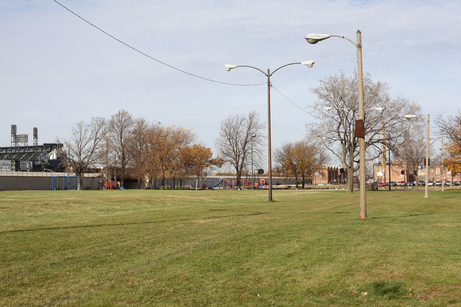-
today's events
Gallery and Bookshop Hours Chicago Architecture Biennial Jan 01, 2026 - Feb 28, 2026
-
upcoming event
-
past events
End-of-year Bookshop Sale Dec 13, 2025 - Dec 20, 2025
Eve Aboulkheir Lampo Performance Series Dec 06, 2025 Performance
Leila Bordreuil and Lee Ranaldo Lampo Performance Series Nov 08, 2025
Roc Jiménez de Cisneros Lampo Performance Series Oct 11, 2025
Concepción Huerta Lampo Performance Series Sep 27, 2025 Performance
Madlener House
4 West Burton Place
Chicago, Illinois 60610
Telephone: 312.787.4071
info@grahamfoundation.org

Mathias Heyden and Ines Schaber, Wentworth Gardens, Chicago, Illinois, USA, 2011, revisited with Roberta Feldman. (A demolished public housing site at State Street remains in front of new affordable housing and the Chicago White Sox stadium.)
Please join us for a public discussion with architect Mathias Heyden and artist Ines Schaber about their Graham-funded research and exhibition Where If Not Us? Participatory Design and Its Radical Approaches. Brief presentations by exhibition participants Roberta Feldman, Landon Bone Baker Architects, and Henry Sanoff will be followed by an open discussion about the past, present, and future of participatory design in Chicago and beyond.
Mathias Heyden is a Berlin-based architect, activist, organizer, author, curator, and co-founder of community project K 77. Currently he is an assistant professor and chair of Urban Design and Architecture at the Institute of Architecture, Technical University Berlin. Heyden is the author of numerous publications including Under Construction, Strategies of Participatory Architecture and Spatial Appropriation (with Jesko Fezer, 2003 - 2007) and the exhibition and magazines An Architecture 19-21: Community Design. Involvement and Architecture in the US since 1963 (with An Architektur, 2008).
Ines Schaber is an artist, photographer, and author living in Berlin, Germany. She studied fine art at the Academy in Berlin, architectural theory at Princeton University, and research architecture at Goldsmiths College, London. Her work addresses the relation of spatial and image politics. Her recent project Movers and Shapers (2001), in collaboration with the architect Jörg Stollmann, investigated the visual politics of master-planned communities in Arizona. In Picture Mining (2006) she explored the relation of historical labor photography to a photographic archive in a former limestone mine below an abandoned landscape in Philadelphia.
Roberta Feldman has been engaged in community design and research for more than thirty years. Embracing participatory design and action research practices, she has sustained working relationships with community leaders in over fifty community organizations and development corporations in Chicago’s low income neighborhoods to address their visions for shaping, revitalizing, and preserving their designed environments. Feldman co-founded the City Design Center in 1995 at the University of Illinois at Chicago. She worked individually as well as coordinated multi-disciplinary teams of students, faculty, and professionals in the fields of architecture, urban planning, graphic and industrial design, and history and culture of cities, to support communities underserved by the design professions. Through the City Design Center, Feldman has initiated numerous advocacy projects as well – forums, summits, exhibits, and websites – to raise awareness among professions and the public of the potential of design to serve public interest.
Landon Bone Baker Architects has served a diverse clientele by bringing community-based and environmentally responsible designs to complex urban environments in the Chicagoland area over the past twenty-five years. LBBA works on a range of project types, from affordable apartment rehabilitations to new single-family homes; from daycare centers to college libraries; and retail stores to office buildings. They approach each project as a team and extend this collaborative effort to client relations and technical consultants. Landon Bone Baker Architects is a hands-on, full-service architectural practice.
Peter Landon, founder and principal of Landon Bone Baker Architects, is known for his community-based, inner city planning, development, and design work. At a time when many architecture offices focused on high-end housing, Peter established Landon Architects Ltd., now LBBA, to balance affordable, public, and market rate projects. LBBA has delivered projects in Roseland, Lawndale, West Humboldt Park, Chinatown, Uptown, and Pilsen, and continues to support neighborhood revitalization efforts across Chicago.
Jeff Bone is a principal in Landon Bone Baker Architects. He is a registered architect in Illinois and Wisconsin and has managed a wide variety of affordable and supportive housing projects throughout Chicago and in Champaign and Urbana. He is currently working on the Viceroy SRO, an 89-unit development that explores green strategies for the historic preservation and adaptive reuse of a 1920s-era building and incorporates an urban farm and teaching kitchen for residents.
Catherine Baker joined Landon Bone Baker Architects in 1994 and was named a principal in 2002. While at LBBA, she has managed various projects including new and renovated single-family housing, multi-family housing, interior office build-outs and a daycare center. Currently she is managing several Hope VI revitalization programs in Chicago. The Hope VI programs include the complete redesign and master planning of neighborhoods where former high-rise housing projects once stood. She is also currently managing the redevelopment of the large project-based Section 8 housing project in Chicago’s Woodlawn neighborhood.
Henry Sanoff is an architect and professor emeritus of architecture at the School of Architecture, College of Design, North Carolina State University, and was the founder and director of the Community Development Group (CDG). Sanoff taught courses related to community participation, social architecture, design research, design methodology, and design programming. His research has concentrated in the areas of social housing, children’s environments, community arts, aging populations, and community participation. Sanoff has extensively published, he conducts workshops worldwide, and is a consultant for various participatory design firms.
Funding for Where If Not Us? has been provided by the Graham Foundation for Advanced Studies in the Fine Arts and the Institut für Auslandsbeziehungen.
For more information on the exhibition, Where If Not Us? Participatory Design and Its Radical Approaches, click here.
Copyright © 2008–2026 Graham Foundation. All rights reserved.